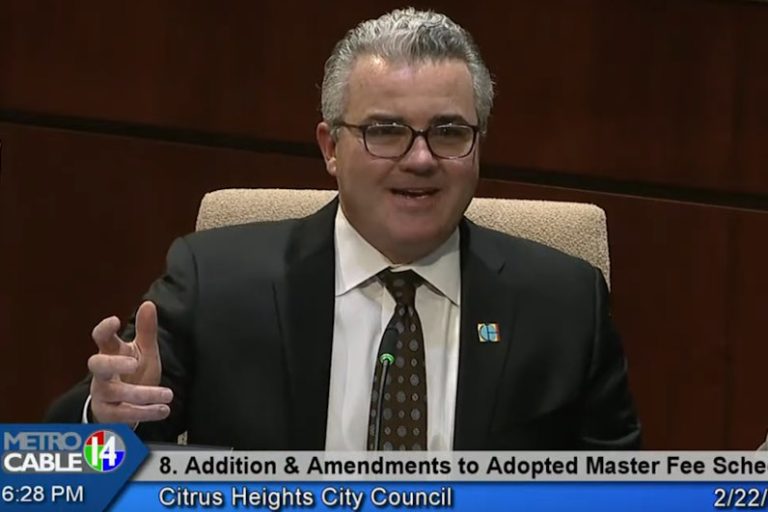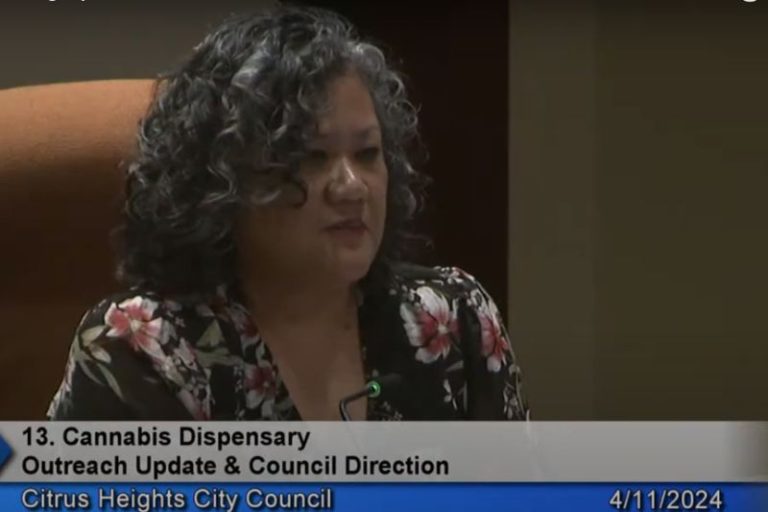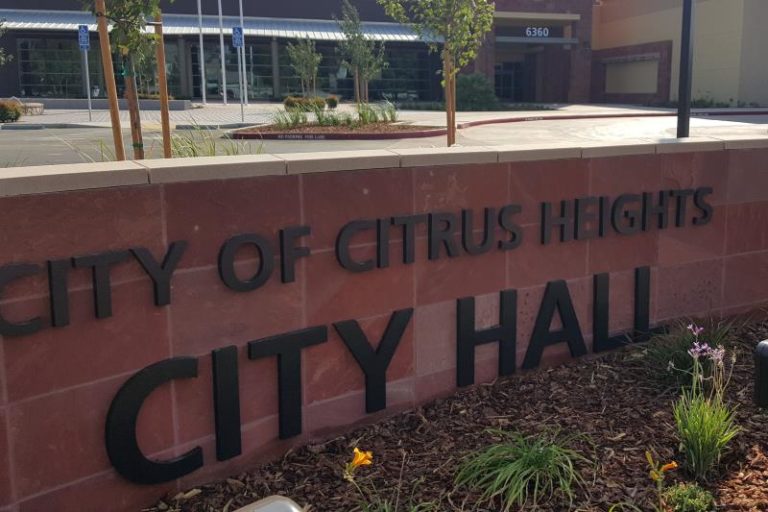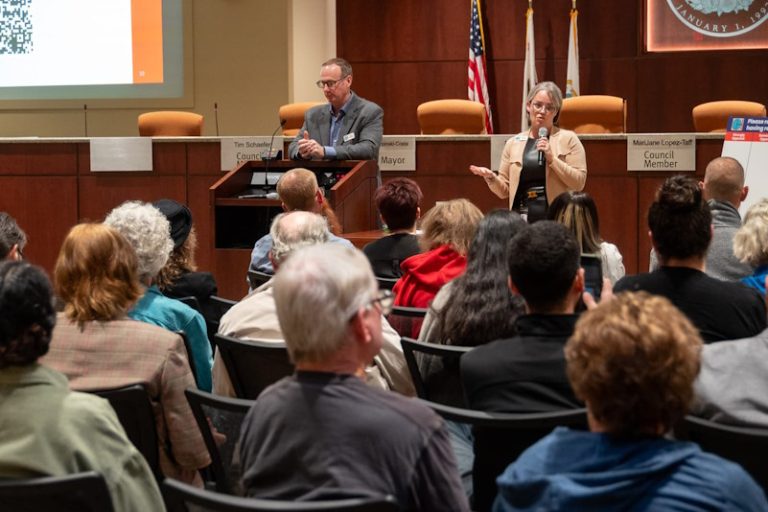
Sentinel staff report–
Citrus Heights residents will have the opportunity to vote on a proposed 1-cent sales tax increase in November, following a 4-1 vote by the City Council on Thursday.
The tax measure, known as Measure M, would permanently add a 1-cent sales tax to boost local revenue by an estimated $12 million per year. The measure would bring the sales tax rate to 8.75%, up from the current 7.75%.
The new funding would represent a significant increase in the city’s current General Fund revenues of around $33 million and would be locally controlled, rather than coming in the form of state or federal grants with strings attached.
Public comment and a vote were held following a lengthy staff presentation projecting that Citrus Heights will have budget shortfalls in eight of the next 10 years, even with a $5-6 million boost beginning in 2022 when the city begins receiving its share of property tax revenue from the county.
Staff projections also show the city’s roads with a $54.9 million backlog, which is projected to more than triple within nine years if current road funding is maintained at about $2.1 million per year. Even with an additional $7.6 million directed towards roads per year, Operations Manager Regina Cave said funding for roads would still be lacking, but the additional funding would stabilize the road conditions at the current average 53-out-of-100 pavement condition index rating, rather than see roads conditions continue to deteriorate.
Cave’s projections still showed the backlog in road repairs rising to $128.8 million by 2029, even with funding increased to $9.3 million per year. At the current rate, projections show the backlog rising to just under $190 million by 2029.
Police Chief Ron Lawrence said during the presentation that his department is facing a $1.6 million shortfall, leaving him with the decision to freeze 17 unfilled positions, which he said includes six sworn officers. He also said body-worn cameras would be preferred but are not an option currently, due to his budget not allowing for the extra $450 – $500,000 annual cost associated with the cameras.
City Manager Chris Boyd told the council the goal of the tax measure is to provide funding “that cannot be taken by the state of California and is to be used only used for local Citrus Heights services.” He also called the measure a potential “turning point” for the city, enabling the city to more fully deliver priority services identified by residents in an extensive survey effort the city has conducted over the past year.
Ballot language approved by the council will present the following question to voters:
“To protect local control with funding that cannot be taken by the State; maintain 911 emergency response times; crime investigation/prevention; well-trained community police officers; school safety/security; pothole/street repair; homelessness reduction programs; local business/jobs support; and other city services, shall a measure to establish a Citrus Heights 1¢ sales tax generating $12,000,000 annually until ended by voters be adopted, with independent annual audits and citizen oversight, and all funds spent in Citrus Heights?”
Council members in support of placing the tax measure on the ballot were Mayor Jeff Slowey, Vice Mayor Steve Miller, and councilwomen Porsche Middleton and Jeannie Bruins. Miller and Middleton both presented the tax as a way for the city to “thrive” rather than “just survive.”
Councilman Bret Daniels, the only council member to oppose the tax measure, called aspects of the staff presentation “compelling,” but said now isn’t the time to raise taxes. He also said the city is partially to blame for its budgetary troubles due to the purchase of a new $21 million City Hall, which was completed in 2016.
Several City Council members were quick to point out that Citrus Heights has long-projected a “crossover” point, when expenses would surpass revenue.
Slowey, who has served on the City Council since 2003, said he recalled the first staff presentation he attended where the crossover was projected to take place by 2006.
“Well, that was 2003; it didn’t happen until now,” said Slowey. “That’s 17 years later it happened, versus three. To me, that was a pretty good save from all of the leadership, the City Council, the staff, to do everything they needed to do to make it so that we didn’t go into the red.”
About 15 comments from the public were heard during the meeting, with speakers either calling in via Zoom or emailing their statements in advance. Comments were roughly split between support and opposition.
A neighborhood association board member advocated for a five or 10-year sunset clause to be added to the measure to give residents more oversight to reauthorize the tax if revenues were deemed to have been spent wisely. The sunset clause was not subsequently addressed during the meeting, but the tax measure as worded includes the creation of a five-member Citizens Oversight Committee to monitor expenditures.
As a general use tax, the measure will only need a bare majority of 50% plus one to pass in November, and its tax revenues are not restricted to specific purposes. Special use taxes require two-thirds support and can only be used for specific purposes authorized by the measure.
A prior special use tax measure in Citrus Heights was proposed in 2012, Measure K, which sought funding for roads and public safety for a period of 10 years. While requiring two-thirds support to pass, the measure only received 44% support.
Polling presented during the council meeting from EMC Research found the latest tax measure would easily pass this November, with over 65% support. Polling was conducted in late June and July of this year, with 404 likely voters and a margin of error of about 5%.
Councilman Daniels expressed skepticism at the poll results and said he believes the measure will fail. Other tax proposals across California have been pulled from the ballot in light of economic uncertainties during the COVID-19 pandemic.
Tax measures on the ballot during the March Primary saw a significant drop in the usual support for such measures. According to the ballot tracking website Ballotpedia, out of 45 sales tax measures on the ballot in March, nearly half were defeated. By comparison, from 2014 to 2019, more than three-quarters of local sales tax measures were approved across the state.
Mayor Slowey acknowledged concerns about timing, saying, “there’s no doubt that with the pandemic out there, it’s a tough time to ask folks.” He said he didn’t know when the right time would be, but said “I think it’s right for the people to decide.”
“I think we’ve laid out a compelling case,” said Slowey. “Sure, you can always cut, but at the end of the day, when you cut, that’s gonna affect services.”
Ballot arguments against the measure are now being accepted through Aug. 6 and can be submitted by individual voters who are eligible to vote on the measure, or “bona fide associations of citizens,” according to the City Clerk’s website.
Want to share your own thoughts on this topic or another local issue?Submit a letter to the editor or opinion column for publication:Click here
Citrus Heights residents will have the opportunity to vote on a proposed 1-cent sales tax increase in November, following a 4-1 vote by the City Council on Thursday.
Thanks for reading The Sentinel. You are either trying to access subscribers-only content or you have reached your limit of 4 free articles per 30 days. Click here to sign in or subscribe.










